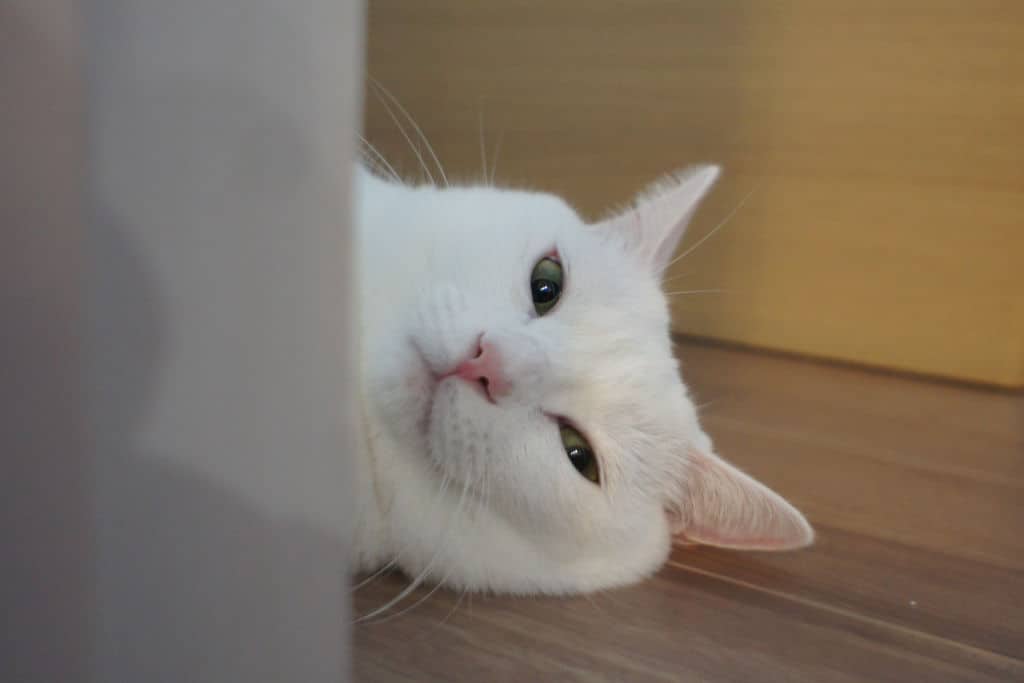Even though cats can interpret some human emotions like happiness and anger, as far as science goes, they do not appear to understand laughter. They enjoy doing things and find the activities enjoyable but cannot laugh or find humor.
This also applies to whether you’re laughing with them or at them. Since cats wouldn’t understand what laughing is, they wouldn’t be able to differentiate between the two.

Do Cats Understand When You Laugh?
For an animal to have the ability to understand that other beings have different perspectives than from their own means they understand the Theory of Mind. Many animals don’t have this capacity, but cats do.
While cats understand some cognitive skills needed for the Theory of Mind, good evidence has yet to be found whether they know humor and laughter.
Even though acknowledging that other creatures have different viewpoints is an accomplishment in and of itself, humor and laughter represent entirely new levels of thinking.
While many of us would like our pets to join us in our laughter, cats do not understand humans on that level and are unconcerned with things like laughing, embarrassment, and humor. Cats have no concept of laughter.
If anything, the cat will begin to associate the sound of laughter with your actions. For example, if they’re playing and you’re laughing at them, laughter becomes a cue for play and good things.
While some research showed cats could use the behavior of humans to find food and toys using pointing, there is still a debate about whether they possess a human-like ToM, and there’s little evidence they understand humor.
Do Cats Know When You’re Happy?
There are studies showing cats understand a range of emotions, from anger to happiness. A cat will know when you are happy and act accordingly depending on the signs you’re showing.
If your temperature or other signals change, they may respond differently. Cats can tell if your body language and tone of voice are relaxed. Animals are adept at catching cues that humans frequently overlook, but cats don’t do well with facial expressions. That’s more in the dog area.
Cats have social skills that enable them to recognize human emotional cues, which is essential for preserving interspecies relationships and fortifying the bond between humans and cats.
Why Would a Cat Come To You When You Laugh?
Cats have discovered that humans communicate through loud vocalization. When you laugh, they may realize that this is how you communicate with others, whether you do it on purpose or not.
If your cat comes to you when you laugh, they may have noticed that other people laugh. Cats’ noses are sensitive enough to detect human hormones and emotions, so he’s probably noticed that laughing with others makes you happier.
Your cat may be trying to be a good friend by approaching you to be social and make you happy. According to research, cats understand happiness, so your cat may interpret your body posture and laughter as a “good thing.”

Why Would Cats Leave When You Laugh?
Despite being domesticated, cats retain many of the predatory instincts of wild cats. The reflex to leave a situation at the first sign of danger is included. They have acute hearing and will respond to life-or-death alarm levels in the event of a sudden noise.
It can also be irritating to shake or move around while laughing. Cats will notice these things due to their evolution and genetic propensity to detect abnormalities. And this will cause them to leave the room and move away.
When observing cats’ reactions to laughter, some pet owners wonder if the feline feels a sense of embarrassment or self-consciousness. Interestingly, while embarrassment as humans know it is a complex emotion, cats might perceive laughter as a shift in the environment or mood, not as a direct reaction to their behavior.
Are Cats Able to Smile or Laugh?
The ability to laugh is a sign of sapient behavior. While cats can understand some emotions and demonstrate evidence of the Theory of Mind, they appear incapable of laughing or smiling. They will show they’re comfortable and trusting, but unfortunately, they may never laugh at our jokes.
Cats’ body language can convey approval and enjoyment, as seen when they hold their tails up, roll around, and curl their paws. On the other hand, laughter is a human emotion that we have yet to discover in cats.
While a study from UCLA in 2021 showed that many animals could laugh when tickled, cats haven’t been shown to laugh. They may purry, hiss, wiggle, or even bite – but they won’t laugh.
In the light of this, when interacting with your cat, focusing on their unique ways of expressing joy, like purring or kneading, can lead to a richer bond. Recognizing and respecting their reactions ensures a harmonious relationship, even if they can’t join in on the human chuckles.
More evidence still needs to be discovered that cats can laugh or understand humor. Until then, we need to read their body language and behavior to know whether they’re happy.
FAQs
Do cats understand human smiles?
Smiling is a human facial expression that cats do not understand. However, they can sense our emotions by the tone of our voices combined with our facial expressions and body language.
Do cats like the sound of laughter?
Cats don’t seem to understand the meaning of laughter, and if your cat does something, it may simply be connecting laughter to some action you’re doing with them. For example, if you’re laughing when playing with them, they may think laughter means playtime.
Do cats understand when you’re depressed?
If you’re feeling down, something in your body may make you more appealing to your cat, such as increased body temperature. Some cats understand us better than others. They notice when we are upset and may go out of their way to console us.
Alex, a passionate animal lover, has experience in training and understanding animal behavior. As a proud pet parent to two dogs and three cats, he founded AnimalReport.net to share insights from animal experts and expand his knowledge of the animal kingdom.




